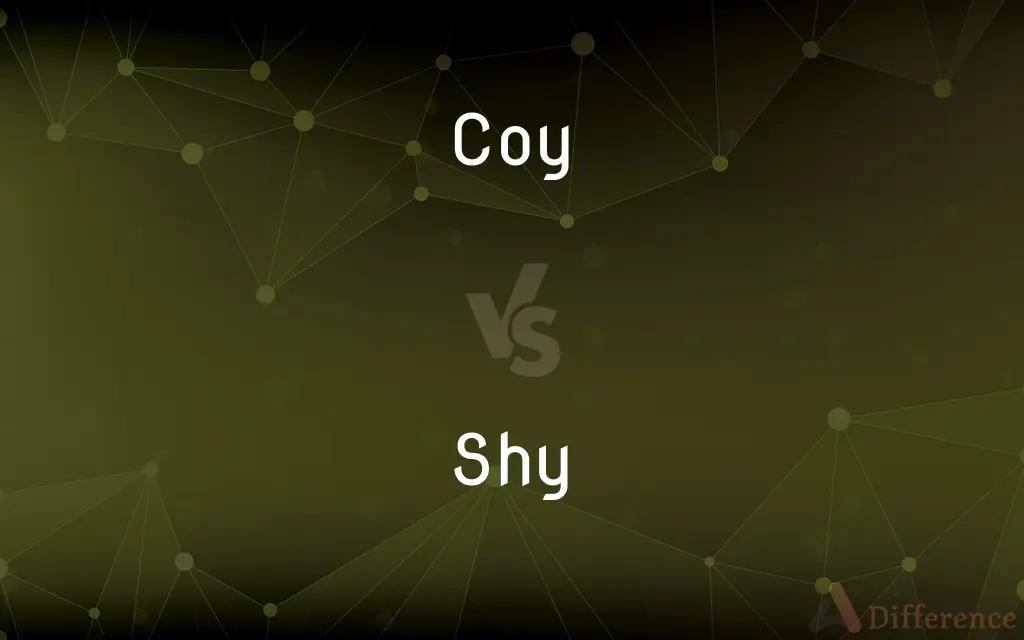Coy vs. Shy — What's the Difference?
Edited by Tayyaba Rehman — By Urooj Arif — Updated on April 4, 2024
Coy implies a flirtatious or playful shyness, while shy denotes a general nervousness or timidity around others, without the flirtatious connotation.

Difference Between Coy and Shy
Table of Contents
ADVERTISEMENT
Key Differences
Coy behavior is characterized by a deliberate display of modesty or shyness used to attract attention or as a form of flirtation. It's often strategic, involving a mixture of reticence and allure to engage someone's interest. On the other hand, shyness is a more straightforward expression of feeling nervous, uneasy, or timid in social situations, without any implied intention of attracting attention. It stems from a lack of confidence or discomfort in being the center of attention.
While coy actions can be seen as a social tactic, often viewed positively in romantic contexts, shyness generally reflects a person's inherent temperament or anxiety in social interactions. Being coy involves a certain level of self-awareness and control over one's actions to achieve a desired effect, such as teasing or hinting interest without direct acknowledgment. In contrast, shyness often results in avoidance behaviors, not out of a desire to engage or attract but from a wish to escape notice or interaction.
Coy behavior might include playful teasing, indirect communication, or modest withholding to provoke curiosity or engagement from others. It’s a nuanced form of social interaction that requires understanding social cues and dynamics. Shy individuals, however, might struggle with social cues and feel overwhelmed or anxious in interactions, leading to avoidance, withdrawal, or silence in social settings.
The distinction also extends to perception. Coy behavior can be perceived as charming or endearing, especially in cultures that value subtlety and indirectness in courtship or social interaction. Conversely, shyness might be viewed as a barrier to social interaction, often perceived negatively in environments that prize extroversion and direct communication.
Understanding the difference is crucial in social dynamics. Recognizing when someone is being coy can facilitate playful and flirtatious interactions, acknowledging the unspoken invitation to engage more deeply. Recognizing shyness, however, calls for sensitivity and support to help the individual feel more comfortable and confident in social situations.
ADVERTISEMENT
Comparison Chart
Definition
Playfully shy or modest, often flirtatiously
Feeling nervous or timid around others
Intention
To attract attention or engage in flirtation
To avoid attention due to discomfort or anxiety
Behavioral Traits
Teasing, modest withholding, indirectness
Avoidance, withdrawal, silence
Perception
Often seen as charming or endearing
Can be viewed as a barrier to social interaction
Social Interaction
Strategic and aware of social cues
Uncomfortable and possibly overwhelmed by social cues
Compare with Definitions
Coy
Flirtatiously modest or reserved.
His coy remarks left her curious and intrigued.
Shy
Preferring to stay unnoticed.
She stayed in the background at parties, too shy to initiate conversations.
Coy
Playfully reticent.
Her coy glances were part of her charm at social gatherings.
Shy
Nervously timid in social settings.
She felt shy around new people, preferring to observe first.
Coy
Using modesty as flirtation.
He was coy in his compliments, making them all the more flattering.
Shy
Uncomfortable with attention.
Despite his talents, he was shy and avoided the spotlight.
Coy
Displaying playful shyness.
She gave a coy smile, hinting she had more to say.
Shy
Feeling anxiety in social situations.
He always felt shy during public speaking, regardless of the audience size.
Coy
Strategically shy to attract attention.
She acted coy to tease her interest in the project.
Shy
Lacking confidence in social interactions.
His shyness made networking events a challenge.
Coy
Affectedly and often flirtatiously shy or modest
"I pictured myself as some sylvan deity, and she a coy wood nymph of whom I was in pursuit" (Washington Irving).
Shy
Nervous or timid in the company of other people
I was pretty shy at school
A shy smile
Coy
Characterized by or suggesting such shyness or modesty
"How absurd I must have looked standing there before him ... a coy little simper on my foolish young face" (Jane Avrich).
Shy
Less than; short of
The shares are 29p shy of their flotation price
Coy
Unwilling to make a commitment or divulge information
"As a child, when I asked my mother her age she was coy and evasive" (Lynne Sharon Schwartz).
Shy
(of a plant) not bearing flowers or fruit well or prolifically.
Coy
Tending to avoid people and social situations; reserved
"The children were staring up at him, too coy to question him and too curious not to stare" (Edwidge Danticat).
Shy
(especially of a horse) start suddenly aside in fright at an object, noise, or movement
Their horses shied at the unfamiliar sight
Coy
(dated) Bashful, shy, retiring.
Shy
Fling or throw (something) at a target
He tore the spectacles off and shied them at her
Coy
(archaic) Quiet, reserved, modest.
Shy
A sudden startled movement, especially of a frightened horse.
Coy
Reluctant to give details about something sensitive; notably prudish.
Shy
An act of flinging or throwing something at a target.
Coy
Pretending shyness or modesty, especially in an insincere or flirtatious way.
Shy
Easily startled; timid
A shy deer.
Coy
Soft, gentle, hesitating.
Shy
Tending to avoid contact or familiarity with others; retiring or reserved
A shy student who stayed in the back of the room.
Coy
To caress, pet; to coax, entice.
Shy
Characterized by reserve or diffidence
A shy glance.
Coy
To calm or soothe.
Shy
Distrustful; wary
Shy of strangers.
Coy
To allure; to decoy.
Shy
Not having a sufficient or specified amount, as of money
Was shy $100 on his rent.
Was two victories shy of the school record.
Coy
A trap from which waterfowl may be hunted.
Shy
To move suddenly or draw back, as if startled or afraid
The horse shied at the loud sound.
Coy
(military) A company
Shy
To avoid engaging in, treating, or discussing something
"a film adaptation that would not shy away from the novel's controversial themes" (Scot French).
Coy
Quiet; still.
Shy
To throw (something) with a swift motion; fling.
Coy
Shrinking from approach or familiarity; reserved; bashful; shy; modest; - usually applied to women, sometimes with an implication of coquetry.
Coy, and difficult to win.
Coy and furtive graces.
Nor the coy maid, half willings to be pressed,Shall kiss the cup, to pass it to the rest.
Shy
To throw something with a swift motion.
Coy
Soft; gentle; hesitating.
Enforced hate,Instead of love's coy touch, shall rudely tear thee.
Shy
A sudden movement, as from fright; a start.
Coy
To allure; to entice; to decoy.
A wiser generation, who have the art to coy the fonder sort into their nets.
Shy
A quick throw; a fling.
Coy
To caress with the hand; to stroke.
Come sit thee down upon this flowery bed,While I thy amiable cheeks do coy.
Shy
(Informal) A gibe; a sneer.
Coy
To behave with reserve or coyness; to shrink from approach or familiarity.
Thus to coy it,With one who knows you too!
Shy
(Informal) An attempt; a try.
Coy
To make difficulty; to be unwilling.
If he coyedTo hear Cominius speak, I 'll keep at home.
Shy
Easily frightened; timid.
Coy
Affectedly modest or shy especially in a playful or provocative way
Shy
Reserved; disinclined to familiar approach.
He is very shy with strangers.
Coy
Showing marked and often playful or irritating evasiveness or reluctance to make a definite or committing statement;
A politician coy about his intentions
Shy
Cautious; wary; suspicious.
Coy
Modestly or warily rejecting approaches or overtures;
Like a wild young colt, very inquisitive but very coy and not to be easily cajoled
Shy
(informal) Short, insufficient or less than.
By our count your shipment came up two shy of the bill of lading amount.
It is just shy of a mile from here to their house.
Shy
Embarrassed.
Shy
(intransitive) To avoid due to caution, embarrassment or timidness.
I shy away from investment opportunities I don't understand.
Shy
(intransitive) To jump back in fear.
The horse shied away from the rider, which startled him so much he shied away from the horse.
Shy
(transitive) To throw sideways with a jerk; to fling.
To shy a stone
Shy a slipper
Shy
(Scottish) (transitive) or (intransitive) To throw a ball with two hands above the head, especially when it has crossed the side lines in a football (soccer) match. To hit the ball back into play from the sidelines in a shinty match.
Shy
An act of throwing.
Shy
A place for throwing.
Coconut shy
Shy
A sudden start aside, as by a horse.
Shy
In the Eton College wall game, a point scored by lifting the ball against the wall in the calx.
Shy
(Scottish) In soccer, a throw-in from the sidelines, using two hands above the head. In shinty, the act of tossing the ball above the head and hitting it with the shaft of the caman to bring it back into play after it has been hit out of the field.
Shy
Easily frightened; timid; as, a shy bird.
The horses of the army . . . were no longer shy, but would come up to my very feet without starting.
Shy
Reserved; coy; disinclined to familiar approach.
What makes you so shy, my good friend? There's nobody loves you better than I.
The embarrassed look of shy distressAnd maidenly shamefacedness.
Shy
Cautious; wary; suspicious.
I am very shy of using corrosive liquors in the preparation of medicines.
Princes are, by wisdom of state, somewhat shy of thier successors.
Shy
Inadequately supplied; short; lacking; as, the team is shy two players.
Shy
Owing money to the pot; - in cases where an opponent's bet has exceeded a player's available stake or chips, but the player chooses to continue playing the hand before adding the required bet to the pot.
Shy
To start suddenly aside through fright or suspicion; - said especially of horses.
Shy
To throw sidewise with a jerk; to fling; as, to shy a stone; to shy a slipper.
Shy
A sudden start aside, as by a horse.
Shy
A side throw; a throw; a fling.
If Lord Brougham gets a stone in his hand, he must, it seems, have a shy at somebody.
Shy
A quick throw;
He gave the ball a shy to the first baseman
Shy
Start suddenly, as from fight
Shy
Throw quickly
Shy
Lacking self-confidence;
Stood in the doorway diffident and abashed
Problems that call for bold not timid responses
A very unsure young man
Shy
Easily startled or frightened
Shy
Short;
Eleven is one shy of a dozen
Shy
Wary and distrustful; disposed to avoid persons or things;
Shy of strangers
Common Curiosities
Can someone be naturally coy?
While coy behavior is often intentional and strategic, some individuals may naturally exhibit a coy demeanor as part of their personality.
What defines someone as coy?
Being coy involves a playful or flirtatious form of shyness intended to attract attention or engage someone's interest.
Is being shy a negative trait?
While some may view shyness as a social hurdle, it's a natural temperament and not inherently negative. It can be managed or embraced as part of one's personality.
How is shyness different from being coy?
Shyness is a general feeling of nervousness or timidity, without the strategic intent to attract through modesty or flirtation.
How can one tell if someone is being coy or just shy?
Observing the context and the individual's actions can help; coy behavior often includes playful or flirtatious elements, whereas shyness is characterized by genuine discomfort or nervousness.
Is being coy effective in all social situations?
The effectiveness of coy behavior depends on the social context and the individuals involved; it may be well-received in flirtatious or playful settings but not in professional or straightforward interactions.
How does one respond to a coy person?
Engaging with a coy person often involves playing along with the flirtation or teasing, recognizing and respecting the subtlety of their approach.
What strategies can shy individuals use to feel more comfortable in social situations?
Strategies may include gradual exposure to social settings, focusing on others instead of oneself, practicing social skills, and seeking supportive friends or groups.
Do cultural differences affect perceptions of coy and shy behavior?
Yes, cultural norms significantly influence how coy and shy behaviors are perceived, with some cultures valuing modesty and indirectness, while others prize directness and extroversion.
Can shyness be overcome?
Many people work through or manage their shyness with practice, support, and sometimes professional help, becoming more comfortable in social situations over time.
Can someone exhibit both coy and shy behaviors?
Yes, individuals can display a combination of both, being coy in comfortable and familiar situations while feeling genuinely shy in new or overwhelming environments.
Are there benefits to being shy?
Shy individuals often have strong observational skills, empathy, and the ability to form deep, meaningful connections.
Can coy behavior be misinterpreted?
Yes, without clear communication, coy behavior can be misinterpreted as disinterest or aloofness.
How can shy individuals build confidence in social situations?
Building confidence can involve practice, positive affirmations, focusing on one's strengths, and gradually stepping out of comfort zones in social settings.
Does being coy imply manipulation?
While coy behavior can be strategic, it doesn't necessarily imply manipulation; it's often a playful way to engage with others.
Share Your Discovery

Previous Comparison
Succession vs. Inheritance
Next Comparison
Repair vs. FixAuthor Spotlight
Written by
Urooj ArifUrooj is a skilled content writer at Ask Difference, known for her exceptional ability to simplify complex topics into engaging and informative content. With a passion for research and a flair for clear, concise writing, she consistently delivers articles that resonate with our diverse audience.
Edited by
Tayyaba RehmanTayyaba Rehman is a distinguished writer, currently serving as a primary contributor to askdifference.com. As a researcher in semantics and etymology, Tayyaba's passion for the complexity of languages and their distinctions has found a perfect home on the platform. Tayyaba delves into the intricacies of language, distinguishing between commonly confused words and phrases, thereby providing clarity for readers worldwide.
















































